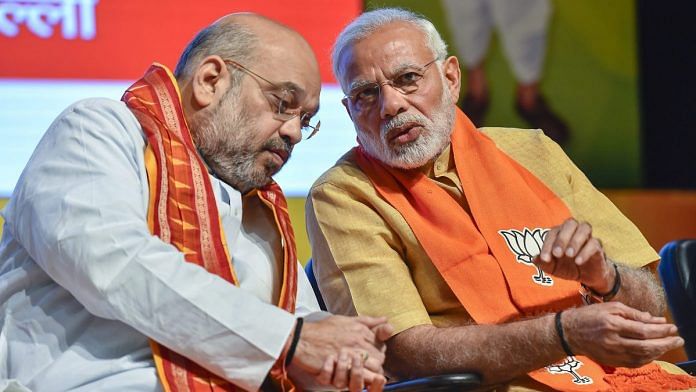The epochal reduction in corporate tax rate by the Narendra Modi government has been welcomed by India’s corporate and investment fraternity in equity markets. The unexpected relief is likely to provide succour to India’s slowing economic engine, which was badly battered after the implosion of the country’s largest shadow bank IL&FS last year. This crisis that led to heightened risk aversion has impacted aggregate demand in many consumer-focused sectors like auto and auto ancillaries, consumer durables and staples, consumer finance including housing, etc. The Reserve Bank of India has responded by embracing aggressive monetary accommodation, and reduced repo rates by 1.1 per cent percentage points since February, besides infusing large amounts of liquidity.
Although equity markets have cheered the unprecedented tax cuts that would sustainably improve the companies’ cash flows and return on equity, bond markets have exhibited a sense of nervousness due to a large shortfall in direct taxes of around Rs 1.2 lakh crores as a result of this measure. This would be in addition to an estimated shortfall of Rs 40,000 crores in GST collections for the current financial year. With government expenses being relatively sticky and inelastic, there are genuine fears of large fiscal slippage. All eyes will be on Modi government’s borrowing programme for the second half of FY 2019-20. Any sharp increase in fiscal deficit is likely to lead to an immediate spike in bond yields and crowding out of productive sectors.
The government needs to lay out a clear roadmap as to how it intends to bridge this yawning revenue loss. The RBI’s transfer of surplus capital of Rs 52,640 crore in addition to the record dividend of Rs 1.23 lakh crore to the Modi government would plug the gap to a certain extent.
Also read: Modi govt bulldozed through corporate tax cuts so PM could look good in Houston
Panch tattva economy needs
There are five immediate measures that the Modi government could undertake to invigorate India’s sagging economy.
First, an aggressive and bold privatisation programme entailing strategic sales of mega PSUs like BPCL, Air India, MTNL, and a few large public sector banks could be considered. This would not only help in bridging the fiscal gap substantially, but also galvanise foreign and domestic companies to pour tens of billions of dollars in acquiring these large Indian franchises. These sales would also stop the continuous haemorrhaging of government finances as a result of the infusion of thousands of crores of tax-payer funds as capital in many of these loss-making basket cases. The government would need to expend its political capital to overcome any opposition for this economically vital though politically not-so-popular measure. With a strong mandate and its political acumen in managing numbers even in the Rajya Sabha, the Modi government must not let go of this opportunity in ushering this reform.
Second, despite reservations expressed by some within the NDA and those in the Left, the Modi government must go ahead with its plan to issue sovereign bonds in foreign currency. It would help diversify the Indian government’s borrowings in different international markets that have immense depth, and offer extremely fine rates. This would also alleviate pressure on domestic interest rates and reduce interest burden for local businesses and individuals.
Third, to encourage long-term investments in equity markets and incentivise risk-taking abilities, the Modi government needs to scrap long-term capital gains tax if an equity share or equity-oriented mutual fund unit is held for three years and beyond. Many long-term investors like pension funds, insurance funds, endowments, family offices and trusts, which typically have a very long-term holding horizon, would provide a strong ballast to the Indian equity market, and help in tamping down the volatility of fickle Foreign Institutional Investor flows.
Also read: Nirmala Sitharaman’s corporate tax cut is tangential, because lack of demand ails economy
Fourth, in the 2019-20 Union Budget, Finance Minister Nirmala Sitharaman announced that FDI caps would be revisited for capital-intensive sectors such as aviation and insurance. The Modi government needs to immediately announce a liberal increase in FDI caps as many global behemoths are waiting eagerly in the wings to participate in one of the largest market opportunities in the world. Any increase in FDI cap for the insurance sector is likely to be accompanied by a similar rise in cap for pension funds. This can help catalyse tens of billions of dollars of FDI inflows immediately, besides infusing a healthy dose of heightened competition in these industries — ultimately benefiting Indian consumers.
Fifth, despite making many pious announcements of monetising assets on large scale of entities like the NHAI (operational roads), surplus land and other non-core assets belonging to the Indian Railways and other government departments as well as increased participation of private sector in the defence sector, the progress has been extremely tardy. The PMO needs to pro-actively intervene, and set time-bound deadlines for these monetisation programmes. Many sovereign wealth funds, global pension funds, etc. need to be wooed as this programme can help India’s cash-starved government in recycling of capital. The amount thus raised can be used as equity capital by these entities. With accompanying debt leverage it would start the virtuous cycle of investments that will have a significant economic multiplier impact.
If the Narendra Modi government wholeheartedly adopts these “panch tattva” or five elements, it will help the Indian economy shed its lethargy and regain a sense of vigour and vitality.
The author is the CEO & Chief Portfolio Manager of PMS Prabhudas Lilladher. Views are personal.




Comrade Narendra Modi’s Mantra for economy-
1. Freebies
2. Subsidies
3. Loan waivers
4. More freebies
5. More subsidies
Fine column. One’s only reservation is on the issue of sovereign bonds denominated in foreign currency.